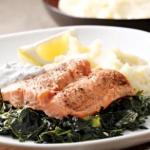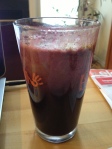The past few weeks I have been working with many athletes – triathletes, runners and cyclists mainly. Some are doing longer distances for the first time, some have been at Ironman or ultra running for a few years. The question aways comes up about the recovery meal. Why do I need one? And what IS a food recovery meal? Funny, but even with non-athletes, I work with a similar issue when trying to balance the blood sugar, and help my clients lose body fat. I might not call it a recovery meal for non-athletes, but why we need a recovery meal is important in many ways.
The recovery meal is basically the meal following an exercise session in basic terms. In general, it should be about 30-60 minutes after your exercise session to maximize recovery – replenishing depleted glycogen stores and amino acids to help muscles rebuild. Depending on whether it was a high intensity/ interval training workout, or a long endurance session, that recovery meal may vary in nutrient content, and replenishing electrolytes and minerals will also be a factor.
So what are some examples or a recovery meal? It will depend on each person’s time and availability and it will also change whether you can include animal proteins  or are vegan. But in a nutshell, the recovery meal should include some high quality proteins – about 3-5 ounces; some high quality carbohydrates – root vegetables or non-wheat grains (usually about 1/2-1 cup); 1 -1 1/2 cups of green vegetables (kale, broccoli, leafy greens, etc) and some high quality fat – 1-2 ounces (raw nuts and seeds, flax seed oil, avocado, etc).
or are vegan. But in a nutshell, the recovery meal should include some high quality proteins – about 3-5 ounces; some high quality carbohydrates – root vegetables or non-wheat grains (usually about 1/2-1 cup); 1 -1 1/2 cups of green vegetables (kale, broccoli, leafy greens, etc) and some high quality fat – 1-2 ounces (raw nuts and seeds, flax seed oil, avocado, etc).
For some the recovery meal will be a quick green smoothie with 1 cup of frozen fruit, protein powder or plain yogurt (preferably from grass fed cows or at least organic), and a cup of kale or collards. Some will add some raw peanut butter or cashews or 1/2 an avocado for fat, or even a tablespoon of flax seeds. There really is not a right or wrong way to make it if you use those basic ingredients.
I like to juice my beets, greens, ginger, orange, lemon, turmeric root and lemon sometimes  as part of my recovery meal vs. pre-exercise meal. It helps me get those minerals, B vits and nutrients in very quickly. But I consider this part of the meal rather than the meal like a smoothie can be. If I have a juice, then I will also have 2-3 ounces of either grilled chicken or chicken jerky I make, and add either a small red baked potato or 1/2 a sweet potato. And sometimes I add some nut butter on that, or i add some real olive oil based mayonnaise. Yes, I did just write mayonnaise!
as part of my recovery meal vs. pre-exercise meal. It helps me get those minerals, B vits and nutrients in very quickly. But I consider this part of the meal rather than the meal like a smoothie can be. If I have a juice, then I will also have 2-3 ounces of either grilled chicken or chicken jerky I make, and add either a small red baked potato or 1/2 a sweet potato. And sometimes I add some nut butter on that, or i add some real olive oil based mayonnaise. Yes, I did just write mayonnaise!
I also like to have a big bowl of mixed greens (arugula, kale, and either romaine or spring mix), add 3 ounces of grilled chicken or fish, a small red potato, handful of raw walnuts or pumpkin seeds, craisins, and sometimes an avocado and 1-2 tablespoons of my homemade vinaigrette dressing. Sometimes, instead of the greens, I will make a salad with leftover steamed or raw broccoli. I call this the Big Bowl Salad. Everything in one bowl! YUM!
And them sometimes, I am just not that hungry after exercise. So I eat either a red potato with some nut butter or avocado slices on a baked red potato, some chicken jerky and then less than 2 hours later is when I eat my recovery meal as indicated above with my greens. Part of why I am writing this is to say that there really is not an exact way you have to do the recovery meal. But within either that meal immediately after or the second meal after, you really want to make sure you get that balance of your protein, healthy carb, healthy fat and lots of greens.
But one thing I have noticed with my athlete clients, if they skip that recovery meal, drink only chocolate milk, or just have an energy bar, they seem to be hungry a few hours later, and then snack all afternoon on carbs and sweet foods. These are the same ones complaining they cannot stop eating after dinner or have a hard time getting leaner. Once we optimize that recovery meal, we balance the blood sugar, and the body starts to burn fat rather than storing it.
Eating is individual as is training. The same plan does not always work for every person. If we work on the recovery meal, then we can optimize your recovery so you can train more the next day, lessen your fatigue, optimize your body fat burning ability and eliminate sugar cravings. Why a recovery meal? To accomplish a better status of health and improve the quality of your life 🙂
For more information about optimizing your recovery meals, or optimizing your nutrition for an upcoming cycling, running or triathlon event, please contact Joanna at www.n-im.net or joanna@n-im.net and review her sports nutrition plans including Race Day Nutrition, Anti-inflammatory and Wheat free plans. Joanna works with each client individually to create a customized plan for each person.
great suggestions – thank you for sharing – brilliant and easy ideas to implement immediately.